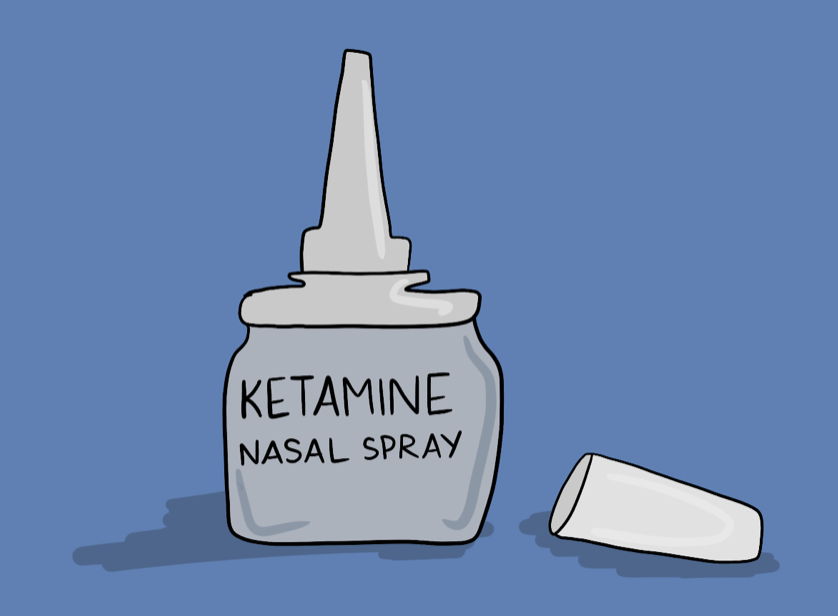Uncertainty surrounding the hype for the new FDA approved drug Spravato
March 21, 2019
Olivia Braito, Graphics Manager
Graphics by Olivia Braito.
According to the Center for Disease Control (CDC), one in six adults face depression in their lifetime and more than 300 million people worldwide suffer from the disorder. While there are certain treatments that exist–such as antidepressants and psychotherapy–to alleviate symptoms of depression, options remain limited. Scientists have claimed for years that esketamine (the chemical cousin of ketamine, a powerful anesthetic that has a history of being used illegally) could be a possible solution for treating individuals with depression. On March 5, the U.S. Food and Drug Administration (FDA) approved the drug Spravato, a nasal spray, taken in conjunction with an oral antidepressant, that contains esketamine.
Due to safety concerns, the drug will only be available through a constrained distribution system to patients with severe cases of depression. Doctors will monitor the administration of the drug, either through their own professional hands or self-administered assistance. As a fast-acting antidepressant drug, Spravato works by restoring brain cells in patients with treatment-resistant depression. While immediate levels of success with the drug’s treatment of depression were found, the side effects of Spravato can be severe. The effects include dizziness, nausea, vertigo, anxiety, increased blood pressure, vomiting, decreased sensitivity, sedation and dissociation, and a feeling of mind-body disconnect.
FDA approval and support of the drug should be met with skepticism. In clinical trials, six patients who were taking the drug died, three from suicide. Although it is difficult to prove that these deaths are drug-related, evidence of the drug playing a role in these deaths should not be ruled out. The reality is, with such a new drug on the market, we lack long-term data on possible physiological and psychological effects.
The most concerning aspects of the drug are diversion and misuse. As the drug relies on the chemical product esketamine, which has some of the active ingredients of ketamine, there is an addictive component which can induce abusive behaviors. I acknowledge that esketamine’s fast-acting role in treating depression and providing a solution to hard-to-treat disorder are both advantages; however, there remains significant scientific uncertainty surrounding the drug. It is still unclear what about ketamine’s chemical make-up triggers a much faster antidepressant response than other drugs. What impact does ketamine have on the brain that other antidepressants do not? Esketamine may pave the way for the first new depression treatment in several decades, but we must proceed with caution. Extensive research must continue on this drug for scientific validation.






















beverly • Mar 22, 2019 at 12:01 pm
This (see link below) got some press, but not as much as warranted — likely because it shows, in a very well done done study (with results that can’t be refuted), that the antidepressant effects are due to the opioid system. This is not remotely surprising, given the fast effect. I’m sure that J&J don’t want this word to spread, as it might give some pause in light of the current issues surrounding the opioid crisis. If esketamine works I personally don’t care what mechanism is involved as long as it is managed safely. So, sadly, this is nothing “new” as opiates have long been shown to lift depression (not cure, but resolve the symptoms).
https://med.stanford.edu/news/all-news/2018/08/ketamines-antidepressive-effects-tied-to-opioid-system-in-brain.html
Joel Paul Self • Mar 22, 2019 at 11:24 am
> Spravato works by restoring brain cells in patients with treatment-resistant depression.
Lol, WTF? No it doesn’t. Nobody is really sure how it works partly because we aren’t really sure what causes depression. But look into glutamatergic antidepressants to see our best guess of what is happening.